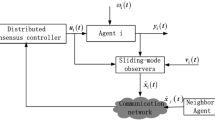Abstract
This paper investigates the distributed finite-time consensus tracking problem for higher-order nonlinear multi-agent systems (MASs). The distributed finite-time consensus protocol is based on full order sliding surface and super twisting algorithm. The nominal consensus control for the MASs is designed based on the geometric homogeneous finite time control technique. The chattering is avoided by designing a full order sliding surface. The switching control is constructed by integrating super twisting algorithm, hence a chattering alleviation protocol is obtained to maintain a smooth control input. The finite time convergence analysis for the leader follower network is presented by using strict Lyapunov function. Finally, the numerical simulations validate the proposed homogeneous full-order sliding mode control for higher-order MASs.
Similar content being viewed by others
References
Li Z, Duan Z, Chen G, et al., Consensus of multiagent systems and synchronization of complex networks: A unified viewpoint, IEEE Transactions on Circuits and Systems I, 2010, 57(1): 213–224.
Canale E, Dalmao F, Mordecki E, et al., Robustness of cucker smale flocking model, IET Control Theory & Applications, 2015, 9(3): 346–350.
Weigang L, de Souza B B, Crespo A M F, et al., Decision support system in tactical air traffic flow management for air traffic flow controllers, Journal of Air Transport Management, 2008, 14: 329–336.
Pack D J, DeLima P, Toussaint G J, et al., Cooperative control of UAVs for localization of intermittently emitting mobile targets, IEEE Transactions on Systems Man & Cybernatics Part B, 2009, 39(4): 959–970.
Ghommam J and Saad M, Backstepping-based cooperative and adaptive tracking control design for a group of underactuated AUVs in horizontal plan, International Journal of Control, 2014, 87(5): 1076–1093.
Yoon S and Qiao C, Cooperative search and survey using autonomous underwater vehicles (AUVs), IEEE Transactions on Parallel and Distributed Systems, 2011, 22(3): 364–379.
Li T and Zhang J F, Consensus conditions of multi-agent systems with time-varying topologies and stochastic communication noises, IEEE Transactions on Automatic Control, 2010, 55(9): 2043–2057.
Mehrjerdi H, Saad M, and Ghommam J, Hierarchical fuzzy cooperative control and path following for a team of mobile robots, IEEE/ASME Transactions on Mechatronics, 2011, 16(5): 907–917.
Zhao D, Zou T, Li S, et al., Adaptive backstepping sliding mode control for leader-follower multiagent systems, IET Control Theory & Applications, 2011, 6(8): 1109–1117.
Dimarogonas D V, Tsiotras P, and Kyriakopoulos K J, Leader-follower cooperative attitude control of multiple rigid bodies, Systems & Control Letters, 2009, 58: 429–435.
Hong Y, Gao L, Cheng D, et al., Lyapunov-based approach to multiagent systems with switching jointly connected interconnection, IEEE Transactions on Automatic Control, 2007, 52(5): 943–948.
Lin P and Jia Y, Consensus of second-order discrete-time multiagent systems with nonuniform time-delays and dynamically changing topologies, Automatica, 2009, 45(9): 2154–2158.
Ghommam J, Mehrjerdi H, and Saad M, Robust formation control without velocity measurement of the leader robot, Control Engineering Practice, 2013, 21: 1143–1156.
Khoo S, Xie L, and Man Z, Robust finite-time consensus tracking algorithm for multirobot systems, IEEE/ASME Transactions on Mechatronics, 2009, 14(2): 219–228.
Ghasemi M, Nersesov S G, Clayton G, et al., Sliding mode coordination control for multiagent systems with underactuated agent dynamics, International Journal of Control, 2014, 87(12): 2612–2633.
Ghasemi M, Nersesovn S G, and Clayton G, Finite-time tracking using sliding mode control, Journal of the Franklin Institute, 2014, 351(5): 2966–2990.
Ghasemi M and Nersesov S G, Finite-time coordination in multiagent systems using sliding mode control approach, Automatica, 2014, 50: 1209–1216.
He X, Wang Q, and Yu W, Finite-time containment control for second-order multiagent systemsunder directed topology, IEEE Transactions on Circuit and Systems II, 2014, 61(8): 619–623.
Yu S and Long X, Finite-time consensus for second-order multi-agent systems with disturbances by integral sliding mode, Automatica, 2015, 54: 158–165.
Guo W, L J, Chen S, et al., Second-order tracking control for leader-follower multi-agent flocking in directed graphs with switching topology, Systems & Control Letters, 2011, 60: 1051–1058.
Cao Y, YuW, RenW, et al., An overview of recent progress in the study of distributed multi-agent, An Overview of Recent Progress in the Study of Distributed Multi-Agent, 2013, 9(1): 427–438.
Wang Z, Zhang W, and Guo Y, Adaptive output consensus tracking of uncertain multi-agent systems, American Control Conference, 2011, 46(13): 3387–3392.
Moulay E and Perruquetti W, Finite time stability conditions for non autonomous continuous systems, International Journal of Control, 2008, 81(5): 797–803.
Levant A, Sliding order and sliding accuracy in sliding mode control, International Journal of Control, 1993, 58(6): 1247–1263.
Levant A, Universal single-input single-output (SISO) sliding-mode controllers with finite-time convergence, IEEE Transactions on Automatic Control, 2001, 46(9): 1447–1451.
Zuo Z, Nonsingular fixed-time consensus tracking for second-order multi-agent networks, Automatica, 2015, 54: 305–309.
Hong Y, Finite-time stabilization and stabilizability of a class of controllable systems, System and Control Letters, 2002, 46: 231–236.
Bhat S P and Bernstein D S, Geometric homogeneity with applications to finite-time stability, Math. Control Signals Systems, 2005, 17: 101–127.
Defoort M, Floquet T, Kokosy A, et al., A novel higher order sliding mode control scheme, System and Control Letters, 2009, 58: 102–108.
Feng Y, Han F, and Yu X, Chattering free full-order sliding-mode control, Automatica, 2014, 50: 1310–1314.
Defoort M, Nollet F, Floquet T, et al., A third-order sliding-mode controller for a stepper motor, IEEE Transactions on Industrial Electronics, 2009, 56(9): 3337–3346.
Moreno J A and Osorio M, Strict lyapunov functions for the super-twisting algorithm, IEEE Transactions on Automatic Control, 2012, 57(4): 1035–1040.
Author information
Authors and Affiliations
Corresponding author
Additional information
This paper was recommended for publication by Editor JIA Yingmin.
Rights and permissions
About this article
Cite this article
Mondal, S., Ghommam, J. & Saad, M. Homogeneous Finite-Time Consensus Control for Higher-Order Multi-Agent Systems by Full Order Sliding Mode. J Syst Sci Complex 31, 1186–1205 (2018). https://doi.org/10.1007/s11424-018-6236-7
Received:
Revised:
Published:
Issue Date:
DOI: https://doi.org/10.1007/s11424-018-6236-7




